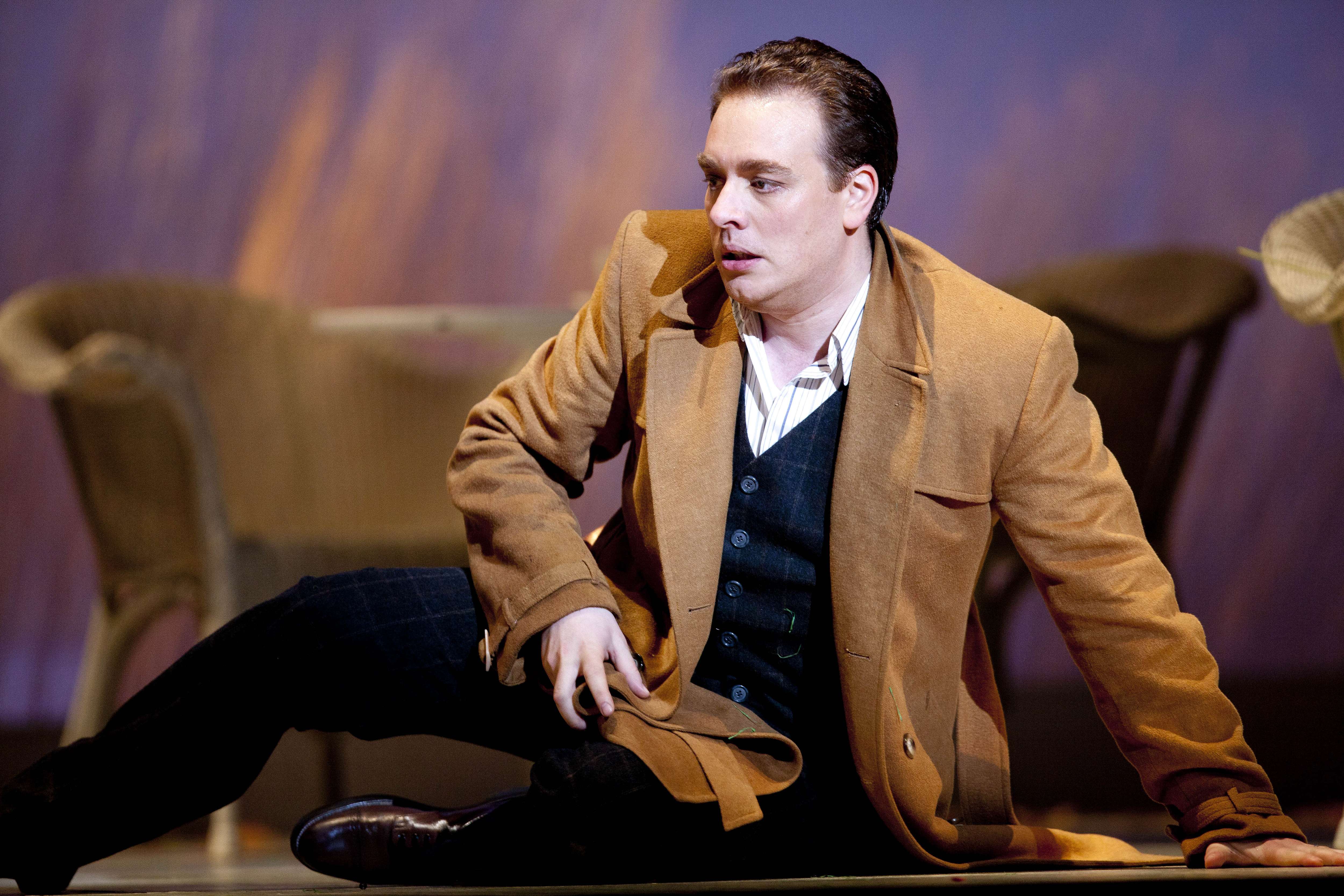|
Back
Vœux de Noël Washington
Kennedy Center Opera House
05/12/2012 - & May 14, 17, 19, 22, 25, 27m, 2012
Jules Massenet: Werther
Julien Robbins (Le Bailli), Kenneth Kellogg (Johann), Tim Augustin (Schmidt), Emily Albrink (Sophie), Francesco Meli (Werther), Sonia Ganassi (Charlotte), Jason Buckwalter (Brühlmann), Maria Dolan Barnes (Kätchen), Andrew Foster Williams (Albert)
Washington National Opera Children’s Chorus, Washington National Opera Orchestra, Michelle Kunz (Children’s Chorus Mistress), Emmanuel Villlaume (Conductor)
Chris Alexander (Director), Michael Yeargan (Set Designer), Barilà (Costume Designer), Mark McCullough (Lighting Designer), François Loup (Diction Coach), Francis Rizzo (Supertitles)

F. Meli (© WNO)
The Washington National Opera concludes it’s 2011/2012 Season with a tender and moving production of Jules Massenet’s tragic romance Werther. This superb production is distinguished by a truly magnificent tenor, a stylish mezzo-soprano, and a sensitive and poetically probing conductor.
The opera is in four acts. The French libretto by Édouard Blau, Paul Milliet, and Georges Hartmann is based on the rather lengthy German epistolary novel, The Sorrows of the Young Werther (Die Leiden des jungen Werthers) by Johann Wolfgang von Goethe. The revised novel was published in 1787 and was an important novel in the “Sturm und Drang” period of German Literature, and had an extremely heavy influence on the later Romantic Movement.
The story is rather implausible for today’s literary public. It deals with a young poet who becomes tragically enamored of a young woman who is already promised in marriage. They have only a very brief and chance encounter, but the young poet decides immediately that the only resolution to his hopeless dilemma is suicide! It seems difficult to fathom, but this depressing tale by Goethe was so popular in its day that it brought suicide into fashion among young hopeless Romantics, who were killing themselves with pistols all over Europe!
Fortunately Werther is one of Massenet’s most intoxicatingly beautiful scores. Indeed, tenors all over the word have been “dying” to sing this role ever since its premiere in Paris at the Opéra Comique in 1893.
The bulk of Massenet’s operas are Grand. Works like Manon, Thaïs, Hérodiade, Esclarmonde, Cléopatre, etcetera, are in four or five acts, require large sets, spectacular costumes, and the Corps de Ballet. Werther on the other hand is a very intimate work, requiring only minimal forces on the stage. There are only three elements that will make any production of this opera successful, and they are the tenor, the mezzo, and the conductor. (And if the tenor is really spectacular, he can carry the show alone.) The Washington National Opera had all three of these elements in spades!
Francesco Meli makes his WNO debut in this production. From the moment he appears onstage the magic begins. He seems to be walking on air, as poets should, and when he begins to sing, the entire opera house seemed to be transported and carried away under his spell. I must confess to being personally entranced and intoxicated by his performance. Mr. Meli’s voice is of a gorgeous, lyric timbre, and his phrasing is completely persuasive. His top notes, (and there are many climactic passages for him to sing), were always thrilling and effortless. By the time Mr. Meli arrived at the ovation following his wonderful rendition of the famous aria “Pourquoi me réveiller?” (Why do you awaken me?), he had already brought the house down three or four times earlier in the evening. I knew nothing about him prior to this evening, but I can assure you he is the “Real Item”, and his performance as the poet Werther is a total tours de force! I would certainly hope the WNO will return him soon to the Kennedy Center stage!
Mezzo-soprano Sonia Ganassi is no stranger to WNO audiences, but I associate her with Italian belcanto operas. I was surprised and delighted to see what an excellent sense of French style and understatement she has in her approach to the role of Charlotte. If there ever was a thankless role for a leading lady…this is it. Her one big moment of the evening comes when she re-reads the letters that Werther has written her, telling her he will come to see her at Christmas.
(Airs des lettres) “Ces lettres! Ah! Je les relis sans cesse…” (These letters! Ah! I re-read them constantly…) Ms. Ganassi was most eloquent and expressive in this scene. She colored her voice with many subtle shades and nuances. This art of vocal shading with color is demanded by so many French composers, and yet it often evades so many singers. It was Sonia Ganassi’s finest moment of the evening.
The real “parfum” was rising from the orchestra pit however, as Maestro Villaume made the most of Massenet’s myriad textures of orchestral color and exotic instrumentation. The extended saxophone solo that accompanies Charlotte in the third act was a real moment to revel in. Hypnotic and seductive as it insinuated itself above the orchestra. There is so much poetry and perfume in this music, and it requires a very sensitive “give and take” between the artists and the pit. Maestro Villaume was keenly attuned to this entrancing style and he led a telling performance that revealed as much as one possibly could from this often elusive but popular score.
Catch this production if you possibly can. A Werther this good can be found on many recordings but seldom finds it’s way onstage in the theater!
Micaele Sparacino
|